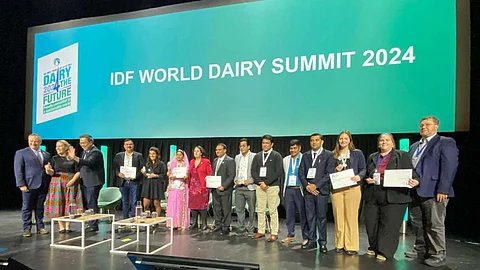

The cooperative model’s crucial role in India’s emergence as the world’s largest milk producer was in focus as Milma Chairman K S Mani made a compelling case at the World Dairy Summit in Paris.
The Milma chairman pointed out that embracing sustainable and innovative practices can transform global dairy sector challenges into opportunities.
K S Mani, who also serves as Director of the National Cooperative Dairy Federation of India (NCDFI), represented Indian dairy farmers at the October summit organised by the International Dairy Federation (IDF).
Speaking on the ‘Indian Dairy Scenario’ at the Farmers’ Round Table, he noted that while new farms in India may encounter some issues due to climate change, the vast domestic market and export potential present considerable opportunities for further growth and success.
Smallholder farmers, representing 80 percent of India’s dairy sector, have begun implementing automation and digital tools to lessen labour demands, the Milma chairman remarked.
“India’s cattle feeding system is particularly sustainable, primarily relying on agricultural residues. By converting these otherwise wasted materials, the system enhances resource efficiency and minimises waste,” he noted.
The summit’s key themes included labour shortages, technological solutions, climate change and sustainability, and broader opportunities and challenges in the dairy sector, attracting stakeholders from across the globe.
Acknowledging that climate change poses challenges for the Indian dairy sector, K S Mani highlighted how smallholder farmers are adopting sustainable practices to mitigate these issues while supporting rural livelihoods.
“India’s cattle feeding system is particularly sustainable, primarily relying on agricultural residues. By converting these otherwise wasted materials, the system enhances resource efficiency and minimises waste,” The Milma chairman, whose experience spans farming, entrepreneurship, and cooperation, noted.
National Dairy Development Board (NDDB) chairman Meenesh C Shah was among those who represented India at the summit.
The event saw the participation of industry stakeholders, farmers’ representatives, senior officials, and dairy development agency representatives from around the world.
The winners of the third annual IDF dairy innovation awards included Amul Dairy for ‘innovation in sustainable farming practices – animal care.’
The award for ‘innovation in sustainable farming practices – socio economic’ went to Sundarban Cooperative Milk & Livestock Producers’ Union Ltd., the first all-women organic dairy cooperative in the Sundarbans, which empowers over 4,500 marginalized women farmers.
The IDF Dairy Innovation Awards, sponsored by the International Dairy Federation, recognize, and promote innovative ideas within the global dairy industry.
With a livestock population of 536.76 million, India’s annual milk output stands at 231 million metric tonnes, accounting for 24-25 percent of global production.
The nation’s per capita milk availability of 459 grams per day surpasses the world average of 322 grams, underscoring the efficiency of its smallholder-led dairy system.
India’s dairy sector, with its 28 state milk federations and 240 district cooperative unions, ensures fair prices for small farmers, preventing exploitation and promoting sustainable growth.
This approach has driven a 6% annual increase in milk production over the past decade, far exceeding the global rate of around 2 percent.